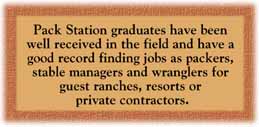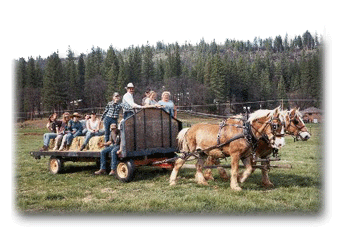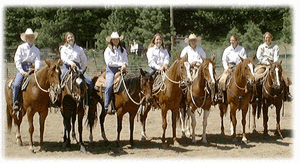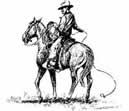
Equine Studies (A.S. & Cert)
About the Equine Program
Horsemanship for the Real World
 The first thing Russell Reid writes on the blackboard is "THINK." This lets students at the Feather River College Pack Station in on Russell's little secret: the packing program isn't just about tying hitches, it's about learning to think like a horse or mule and thinking through any situation they may encounter.
The first thing Russell Reid writes on the blackboard is "THINK." This lets students at the Feather River College Pack Station in on Russell's little secret: the packing program isn't just about tying hitches, it's about learning to think like a horse or mule and thinking through any situation they may encounter.
"If I can get them to think, I've done my job," explains Russell. Of course, Russell does teach the basic principles of horsemanship and expose students to the skills necessary to work with horses and manage a business. The students' success, however, depends on their ability to apply these concepts and skills in a thoughtful manner.
 Russell first conceived of the Equine Studies program back in the 1970s after starting his own resort and summer camp in the northern Sierra Nevada. He was concerned with the needs of the industry and the skill level of his employees. This experience convinced Russell that managing people and horses in a recreational setting was "something worth studyin'." A Bachelor of Science in Agriculture Business from California State Polytechnic University, San Luis Obispo, a Master of Science in Recreation Administration from California State University, Sacramento, and a lifelong love of horses mingled in Russell's fertile imagination creating the vision which in 1981 became the Feather River College Pack Station and Stable Operations program. Program requirements include: horseshoeing, draft horse driving, western riding, horse production, horse conformation, horse training, field work and pack station and stable operations.
Russell first conceived of the Equine Studies program back in the 1970s after starting his own resort and summer camp in the northern Sierra Nevada. He was concerned with the needs of the industry and the skill level of his employees. This experience convinced Russell that managing people and horses in a recreational setting was "something worth studyin'." A Bachelor of Science in Agriculture Business from California State Polytechnic University, San Luis Obispo, a Master of Science in Recreation Administration from California State University, Sacramento, and a lifelong love of horses mingled in Russell's fertile imagination creating the vision which in 1981 became the Feather River College Pack Station and Stable Operations program. Program requirements include: horseshoeing, draft horse driving, western riding, horse production, horse conformation, horse training, field work and pack station and stable operations.
Russell's horsemanship philosophy began to evolve when he was introduced to Ray Hunt by some of his students in the early 1980s.
 It continued to develop with the help of Tom Dorrance, Bryan Neubert, Dr. Richard Barsaleau, Chuck Mills, Gene Armstrong, Pat Parelli, Tink Elordi, Roger Hunt and many others. Russell admits, though that his greatest teachers are the horses and his students and what they accomplish together against tremendous odds.
It continued to develop with the help of Tom Dorrance, Bryan Neubert, Dr. Richard Barsaleau, Chuck Mills, Gene Armstrong, Pat Parelli, Tink Elordi, Roger Hunt and many others. Russell admits, though that his greatest teachers are the horses and his students and what they accomplish together against tremendous odds.
.jpeg?mask=1) "Horses and humans are capable of a very special partnership, a kinship, a unity of spirit," says Russell. This is what he teaches his students to strive for. "I have high expectations of my students," Russell admits. "If you don't expect much from your horse you won't get much; it's the same with students. They may not always fulfill your expectations, but they'll achieve more than they thought they could."
"Horses and humans are capable of a very special partnership, a kinship, a unity of spirit," says Russell. This is what he teaches his students to strive for. "I have high expectations of my students," Russell admits. "If you don't expect much from your horse you won't get much; it's the same with students. They may not always fulfill your expectations, but they'll achieve more than they thought they could."
In 1989 Russell started a breeding and sales program to help support the Equine Studies and more importantly "to allow the students to work with the horses through the whole process."
 The students are involved from the moment the foals are born until they are sold as riding horses. They try to prepare the horses for whatever circumstances they might encounter when they leave the station. "There are no excuses," says Russell, "if the horse won't get in the trailer when the time comes, they can't blame anyone but themselves." One of the highlights of the Equine Studies program is the annual Plumas Sierra Ranch Horse Sale where student raised and trained horses from the school's breeding program are sold. So far the program has met with tremendous success, if repeat buyers are any indication.
The students are involved from the moment the foals are born until they are sold as riding horses. They try to prepare the horses for whatever circumstances they might encounter when they leave the station. "There are no excuses," says Russell, "if the horse won't get in the trailer when the time comes, they can't blame anyone but themselves." One of the highlights of the Equine Studies program is the annual Plumas Sierra Ranch Horse Sale where student raised and trained horses from the school's breeding program are sold. So far the program has met with tremendous success, if repeat buyers are any indication.
.jpeg?mask=1) Horse ownership is not necessary to participate in the program. FRC has its own string of trail horses, an American Quarter Horse Association stallion and several brood mares. The breeding stock add a component to the program that provides students with practical experience in horse production and training. Students care for and train foals in preparation for sale as three to five year olds, contributing to support of the program.
Horse ownership is not necessary to participate in the program. FRC has its own string of trail horses, an American Quarter Horse Association stallion and several brood mares. The breeding stock add a component to the program that provides students with practical experience in horse production and training. Students care for and train foals in preparation for sale as three to five year olds, contributing to support of the program.
An annual series of special workshops feature nationally-known experts in fields such as training, conformation, horseshoeing and pulling. The biannual three-day pack trip is the highlight of the program for many students.
Student Employment jobs are provided at the Equine Center to allow eligible students to help fund their educations and gain additional experience, by helping to maintain the facility.
Equine Studies graduates have been well received in the field and have a good record finding jobs as packers, stable managers and wranglers for guest ranches, resorts and private contractors. The Equine Studies curriculum was approved as a two-year degree program in 1987 and is the only one of its kind in the country.
Kathleen Parrish contributed to this program description. Kathleen is the technical editor of The Trail Less Traveled, a national publication for the Natural Horsemen available through:
Winsor Publishing Company
P.O. Box 187, Boulder, CO 80306

FRC Equine Studies
equinestudies@frc.edu • 530-283-0202 ext. 272
570 Golden Eagle Avenue • Quincy, CA 95971
This site provides information using PDF, visit this link to download the Adobe Acrobat Reader DC software.
